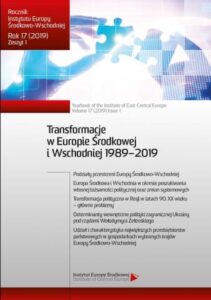ORCID: Mateusz Rafał: 0000-0002-4094-5020
Pages: 351-375
Edition: Lublin 2019
DOI: 10.36874/RIESW.2019.1.17.
Citation method: M. Rafał, D. Borek, Potencjał kooperacji turystycznej i piłkarskiej w państwach Grupy Wyszehradzkiej, „Rocznik Instytutu Europy Środkowo-Wschodniej” 17 (2019), z. 1, s. 351-375, DOI: 10.36874/RIESW.2019.1.17.
Abstract:
This article takes up the innovatory subject of cooperation in the field of football and the tourism sector by the Visegrad Group states. The subject matter of this study has not been widely discussed in the literature, hence most of de lege ferenda postulates are open to further discussion. The current Visegrad Group was created as a political project, not an evolutionary social initiative. This does not mean, however, that the societies of its member states are significantly different from each other, and the structure itself is exotic. The benefits of an extended cooperation, which seems not to have an alternative, for all the participants are fully understood. Therefore, the direction of common thinking about maximizing profits in the developing sector of tourism, and making the most of the social potential of football, can be an attractive platform for international dialogue and extended cooperation among the V4 countries. The baggage of history, geographic and cultural proximity, the migration crisis, as well as the imperialist policy of the neighbouring Russia effectively motivate to strengthen cooperation and create stronger mechanisms with each other. It is indisputable that the tendencies for cooperation in the Visegrad countries are not a novelty.

PDF: Download